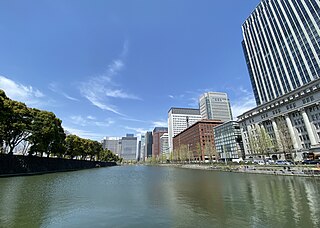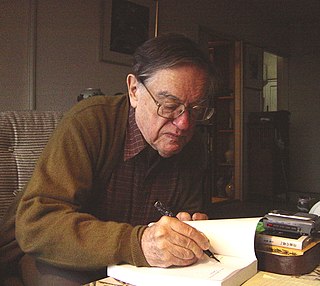Related Research Articles

Anime is hand-drawn and computer-generated animation originating from Japan. Outside Japan and in English, anime refers specifically to animation produced in Japan. However, in Japan and Japanese, anime describes all animated works, regardless of style or origin. Many works of animation with a similar style to Japanese animation are also produced outside Japan. Video games sometimes also feature themes and art styles that are sometimes labelled as anime.

Akihabara is a neighborhood in the Chiyoda ward of Tokyo, Japan, generally considered to be the area surrounding Akihabara Station. Administratively, the area named Akihabara is actually found in the Sotokanda (外神田) and Kanda-Sakumachō districts in Chiyoda. There also exists an administrative district called Akihabara in the Taitō ward further north of Akihabara Station, but it is not the place people generally refer to as Akihabara.

Manga are comics or graphic novels originating from Japan. Most manga conform to a style developed in Japan in the late 19th century, and the form has a long history in earlier Japanese art. The term manga is used in Japan to refer to both comics and cartooning. Outside of Japan, the word is typically used to refer to comics originally published in Japan and published in translation, i.e. a Japanese comic book with English text.

Yaoi, also known as boys' love and its abbreviation BL, is a genre of fictional media originating in Japan that features homoerotic relationships between male characters. It is typically created by women for women and is thus distinct from bara, a genre of homoerotic media marketed to gay men, though yaoi does also attract a male audience and can be produced by male creators. Yaoi spans a wide range of media, including manga, anime, drama CDs, novels, video games, television series, films, and fan works. While "yaoi" is commonly used in the west as an umbrella term for Japanese-influenced media with male-male relationships, "boys' love" and "BL" are the generic terms for this kind of media in Japan and much of Asia.

Marunouchi (丸の内) is a commercial district located in Chiyoda, Tokyo, Japan. Situated between Tokyo Station and the Imperial Palace, the name, meaning "inside the circle", derives from its location within the palace's outer moat. It is also Tokyo's financial district and the country's three largest banks are headquartered there.
In Japanese popular culture, lolicon is a genre of fictional media which focuses on young girl characters, particularly in a sexually suggestive or erotic manner. The term, a portmanteau of the English words "Lolita" and "complex", also refers to desire and affection for such characters, and fans of such. Associated mainly with stylized imagery in manga, anime, and video games, lolicon in otaku culture is generally understood as distinct from desires for realistic depictions of girls, or real girls as such, and is associated with moe, or feelings of affection for fictional characters.

Tokyopop is an American distributor, licensor and publisher of anime, manga, manhwa and Western manga-style works. The German publishing division produces German translations of licensed Japanese properties and original English-language manga, as well as original German-language manga. Tokyopop's US publishing division publishes works in English. Tokyopop has its US headquarters near Los Angeles International Airport in Los Angeles, California. Its parent company's offices are in Tokyo, Japan and its sister company's office is in Hamburg, Germany.

Donald Lawrence Keene was an American-born Japanese scholar, historian, teacher, writer and translator of Japanese literature. Keene was University Professor emeritus and Shincho Professor Emeritus of Japanese Literature at Columbia University, where he taught for over fifty years. Soon after the 2011 Tōhoku earthquake and tsunami, he retired from Columbia, moved to Japan permanently, and acquired citizenship under the name Kīn Donarudo. This was also his poetic pen name and occasional nickname, spelled in the ateji form 鬼怒鳴門.

Machiko Hasegawa was a Japanese manga artist and one of the first female manga artists. She started her own comic strip, Sazae-san, in 1946. It reached national circulation via the Asahi Shimbun in 1949, and ran daily until Hasegawa decided to retire in February 1974. All of her comics were printed in Japan in digest comics; by the mid-1990s, Hasegawa's estate had sold over 60 million copies in Japan alone.
Sophia University, is a private research university in Tokyo, Japan. Founded in 1913 by the Jesuits, it was granted university status in 1928, becoming the first Catholic university in Japan.
Meiji University is a private research university in Chiyoda, Tokyo, Japan. Originally founded as Meiji Law School by three lawyers in 1881, it became a university in April 1920.

Tarō Asō is a Japanese politician serving as the Vice President of the Liberal Democratic Party (LDP) since 2021. Asō previously served as Prime Minister of Japan from 2008 to 2009 and as Deputy Prime Minister of Japan and Minister of Finance from 2012 to 2021. He was the longest-serving Deputy Prime Minister and Minister of Finance in Japanese history, having previously served as Minister for Foreign Affairs from 2005 to 2007 and as Minister for Internal Affairs and Communications from 2003 to 2005. He leads the Shikōkai faction within the LDP.

Hakusensha, Inc. is a Japanese publishing company. It is headquartered in Chiyoda, Tokyo.
Yuricon was an anime convention geared toward fans of yuri anime and manga. The first Yuricon event was held in 2003 in Newark, New Jersey with about 200 attending, although Yuricon has existed as an online entity since 2000. The event was organized by Yuricon, LLC., which continues to run Yuri-focused events of its own, collaborates with other organizations to hold unique events, and hosts contests.
Manga, or comics, have appeared in translation in many different languages in different countries. France represents about 40% of the European comic market and in 2011, manga represented 40% of the comics being published in the country. In 2007, 70% of the comics sold in Germany were manga. In the United States, manga comprises a small industry, especially when compared to the inroads that Japanese animation or Japanese video games have made in the USA. One example of a manga publisher in the United States, VIZ Media, functions as the American affiliate of the Japanese publishers Shogakukan and Shueisha. Though the United Kingdom has fewer manga publishers than the U.S., most manga sold in the United Kingdom are published by U.S. publishing companies like Viz media and Kodansha Comics which are in turn owned by their Japanese counterparts. Alongside the United Kingdom, the U.S. manga publishers also sell their English translated manga in other English speaking nations like Canada, Australia and New Zealand with manga being quite popular in Australia compared to other English speaking countries.

Gengoroh Tagame is a pseudonymous Japanese manga artist. He is regarded as the most prolific and influential creator in the gay manga genre. Tagame began contributing manga and prose fiction to Japanese gay men's magazines in the 1980s, after making his debut as a manga artist in the yaoi manga magazine June while in high school. As a student he studied graphic design at Tama Art University, and worked as a commercial graphic designer and art director to support his career as a manga artist. His manga series The Toyed Man, originally serialized in the gay men's magazine Badi from 1992 to 1993, enjoyed breakout success after it was published as a book in 1994. After co-founding the gay men's magazine G-men in 1995, Tagame began working as a gay manga artist full-time.
Alfred Robert Kahn is an American executive. From 1991 to 2011, he was chairman and CEO of 4Kids Entertainment, a company that is a global provider of children's entertainment and merchandise licensing. He previously led the licensing division for the Coleco company. In 1995, he turned Leisure Concepts, Inc. into 4Kids Entertainment, having previously served as chairman and CEO of the company since March 1991. In 2002, he founded the National Law Enforcement and Firefighters Children's Foundation. In 2012 he co-founded CraneKahn LLC and was the CEO and co-owner of that company. In 2019 CraneKahn folded into Kidtagious.
Digital Hollywood University is a private university in Chiyoda, Tokyo, Japan. The predecessor of the school was founded in 1994, and it was chartered as a university on April 1, 2005 by Digital Hollywood Corporation, a school establishment corporation based on the Act on Special Districts for Structural Reform.

Kodansha Ltd. is a Japanese privately held publishing company headquartered in Bunkyō, Tokyo. Kodansha publishes the manga magazines Nakayoshi, Afternoon, Evening, Weekly Shōnen Magazine, and Bessatsu Shōnen Magazine, as well as the more literary magazines Gunzō, Shūkan Gendai, and the Japanese dictionary Nihongo Daijiten. Kodansha was founded by Seiji Noma in 1910, and members of his family continue as its owners either directly or through the Noma Cultural Foundation.

Chiyoda, known as Chiyoda City in English, is a special ward of Tokyo, Japan. Located in the heart of Tokyo's 23 special wards, Chiyoda consists of the Imperial Palace and a surrounding radius of about a kilometer, and is known as the political and financial center of Japan. As of October 2020, the ward has a population of 66,680, and a population density of 5,709 people per km2, making it by far the least populated of the special wards. The total area is 11.66 km2, of which the Imperial Palace, Hibiya Park, National Museum of Modern Art, and Yasukuni Shrine take up approximately 2.6 km2, or 22% of the total area.
References
- ↑ "Company Overview (Japanese): date of est.." Japan Publishing Industry Foundation for Culture. Retrieved on June 1, 2021. Address: 4th Floor Kyodo Building, 2−30, Kanda Jinbocho 2-chome, Chiyoda-ku, Tokyo 〒101-0051, Japan
- ↑ "Company Overview (Japanese)." Japan Publishing Industry Foundation for Culture. Retrieved on June 7, 2021.